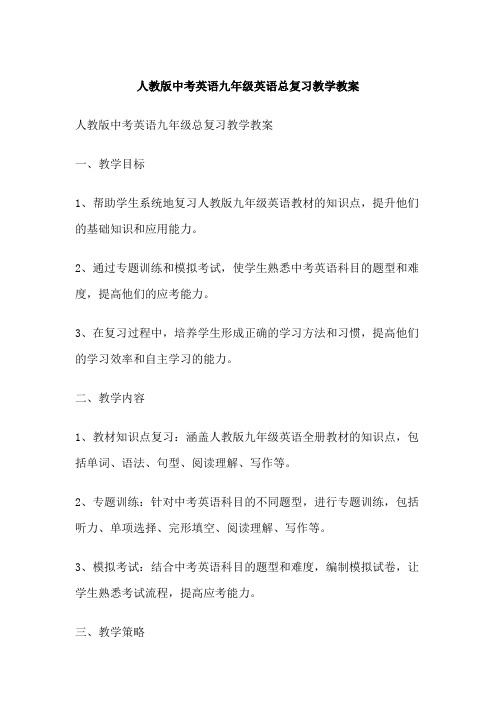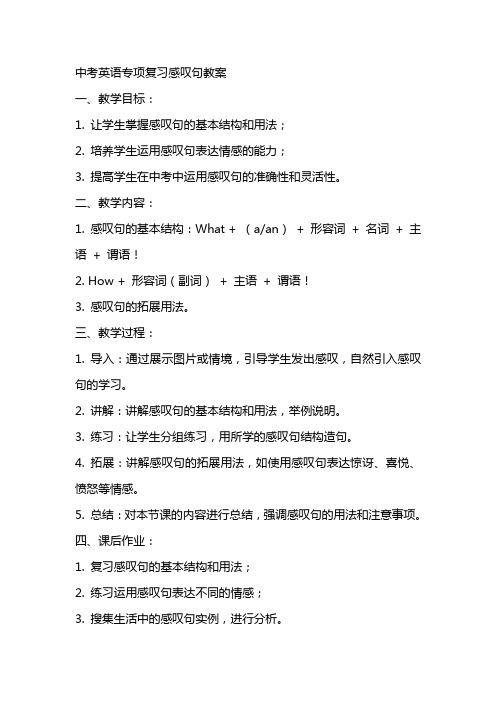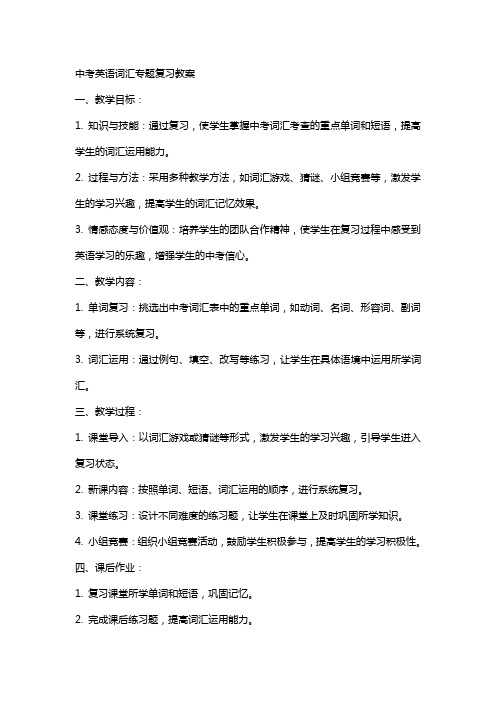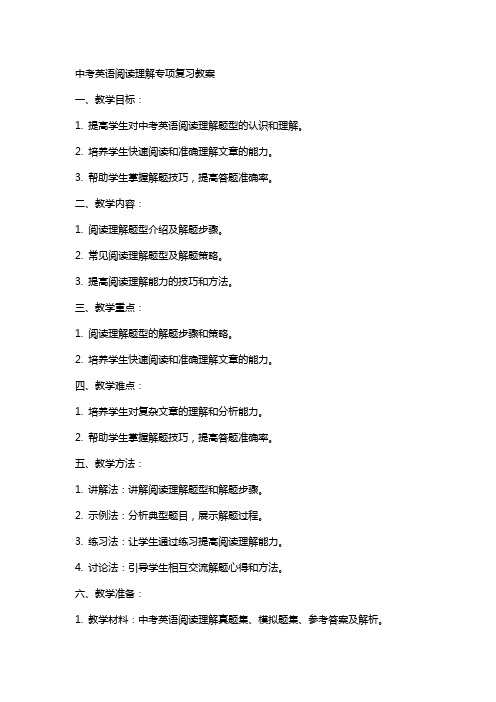中考英语专项复习教案
人教版中考英语九年级英语总复习教学教案

人教版中考英语九年级英语总复习教学教案人教版中考英语九年级总复习教学教案一、教学目标1、帮助学生系统地复习人教版九年级英语教材的知识点,提升他们的基础知识和应用能力。
2、通过专题训练和模拟考试,使学生熟悉中考英语科目的题型和难度,提高他们的应考能力。
3、在复习过程中,培养学生形成正确的学习方法和习惯,提高他们的学习效率和自主学习的能力。
二、教学内容1、教材知识点复习:涵盖人教版九年级英语全册教材的知识点,包括单词、语法、句型、阅读理解、写作等。
2、专题训练:针对中考英语科目的不同题型,进行专题训练,包括听力、单项选择、完形填空、阅读理解、写作等。
3、模拟考试:结合中考英语科目的题型和难度,编制模拟试卷,让学生熟悉考试流程,提高应考能力。
三、教学策略1、知识点复习:采用多种教学方法,如讲解、讨论、提问、练习等,使学生更好地掌握教材知识点。
2、专题训练:通过示范、实例分析、课堂讨论等方式,使学生掌握不同题型的解题技巧和策略。
3、模拟考试:在模拟考试中,引导学生按照考试要求和时间分配,培养他们的应考心态和策略。
四、教学评估1、课堂表现:观察学生在课堂上的表现,包括参与度、专注度、理解能力等。
2、作业和练习:检查学生完成作业和练习的情况,评估他们的学习效果和掌握程度。
3、模拟考试:分析学生在模拟考试中的表现,评估他们的应考能力和水平。
五、教学资源1、教材:人教版九年级英语全册教材。
2、教学软件:多媒体教学软件,包括教学PPT、视频、音频等。
3、学习网站:提供一些与中考英语复习相关的网站和资源,方便学生自行查阅和学习。
4、辅导材料:选择一些与中考英语相关的辅导材料,如习题集、模拟试卷等,供学生练习和提高。
六、教学进度安排根据中考时间安排和学生实际情况,可以将整个复习过程分为三个阶段:1、第一阶段:全面复习(2个月)。
按照教材章节顺序,系统地复习知识点,进行基础训练和专题训练。
2、第二阶段:强化训练(1个月)。
中考英语专项复习感叹句教案

中考英语专项复习感叹句教案一、教学目标:1. 让学生掌握感叹句的基本结构和用法;2. 培养学生运用感叹句表达情感的能力;3. 提高学生在中考中运用感叹句的准确性和灵活性。
二、教学内容:1. 感叹句的基本结构:What + (a/an)+ 形容词+ 名词+ 主语+ 谓语!2. How + 形容词(副词)+ 主语+ 谓语!3. 感叹句的拓展用法。
三、教学过程:1. 导入:通过展示图片或情境,引导学生发出感叹,自然引入感叹句的学习。
2. 讲解:讲解感叹句的基本结构和用法,举例说明。
3. 练习:让学生分组练习,用所学的感叹句结构造句。
4. 拓展:讲解感叹句的拓展用法,如使用感叹句表达惊讶、喜悦、愤怒等情感。
5. 总结:对本节课的内容进行总结,强调感叹句的用法和注意事项。
四、课后作业:1. 复习感叹句的基本结构和用法;2. 练习运用感叹句表达不同的情感;3. 搜集生活中的感叹句实例,进行分析。
五、教学评价:1. 课堂参与度:观察学生在课堂上的积极参与情况和发言积极性;2. 练习完成情况:检查学生课后作业的完成质量,对感叹句的运用情况进行评价;3. 口语表达:在课堂上随机抽取学生进行感叹句的口语表达,评价其准确性and灵活性。
六、教学活动:1. 案例分析:提供一些中文的感叹句,让学生翻译成英文,分析其结构。
2. 角色扮演:学生分组,扮演不同场景下的人物,使用感叹句来表达情感。
3. 小组竞赛:设立竞赛环节,让学生在规定时间内,看图说话,使用感叹句表达图中的情境。
七、教学策略:1. 直观展示:通过图片、视频等直观材料,引发学生的情感共鸣,引导学生自然地使用感叹句。
2. 互动式教学:鼓励学生积极参与,通过问答、讨论等形式,提高学生的实际运用能力。
3. 任务型教学:设计具有实际意义的任务,让学生在完成任务的过程中,运用感叹句。
八、教学难点:1. 感叹句的语调:强调感叹句的语调变化,让学生掌握正确的语调,以表达真实的情感。
中考英语语法专项复习《动词的分类》教案

课例名称The Classification Of Verbs 动词的分类专项复习学校姓名教材初中英语(人教版)课型专项复习课课时1课时学情分析1.本次授课对象是初三平衡班的学生,两极分化较大,一部分同学对英语有较浓厚的兴趣和热情。
在英语课堂上他们普遍对于新学的知识都有着强烈的好奇心,表现欲强。
另一部分学生因为基础较差对英语失去兴趣和信心,这两类学生都希望得到老师和同学们的认可和赞扬。
2.学生在学习这节动词的分类专项复习课的时候就已经大概掌握了动词的分类及其用法,所以对该复习课的重难点比较熟悉,能通过再次学习来巩固知识点。
3.在学习本课前学生基本能够使用合作小组的方法进行任务型学习;用英语开展思维,发表个人意见。
在教师预设的任务中,引导学生在讨论交流中动态生成,学生有交流的时间,便乐于合作分享。
这样就有利于他们更好的运用相关知识,达到提高综合运用听说读写的目的,从而提高他们的综合应试能力。
内容分析本节课是初三年级第二学期的语法复习课,通过对教材和复习资料的整合设计,按专项分类的复习课之一。
通过复习动词的分类及其用法,使学生学会运用各种类的动词。
动词的分类是中学阶段很重要的一个语法点,是每年中考的必考点。
中考考点主要是考如下几个方面:连系动词,实义动词(及物与不及物动词),情态动词,动词时态等,所以本节课是主要复习以上几种类型的动词。
教学目标1、语言知识目标:通过复习动词的分类的语法功能,全面掌握各种类型动词的用法。
2、语言技能目标:学会熟练运用各种类型的动词。
3、情感态度目标:学会自主、合作学习和教师引导学生自己解决问题。
4、学习策略目标:通过合作学会总结所接触的语言材料中的语言规律并加以应用,而且在中考模拟训练中进一步形成理想的解题技巧和完美的解题思路。
教学重连系动词,实义动词(及物与不及物),情态动词, 动词时态等的相关复习The Classification Of Verbs动词的分类专项复习导学案一,学习目标:1、能够正确使用连系动词,实义动词(及物动词和不及物动词),情态动词等。
中考英语考复习专项首字母填空教案

一、教学目标:1. 知识与技能:使学生掌握首字母填空的基本解题技巧,提高学生的阅读理解能力和词汇运用能力。
2. 过程与方法:通过实例分析、练习讲解、小组讨论等方式,引导学生主动探索、合作学习,培养学生的英语思维能力。
3. 情感态度与价值观:激发学生学习英语的兴趣,增强学生的自信心,培养学生坚持不懈、勇于挑战的精神。
二、教学内容:1. 首字母填空的定义和特点2. 首字母填空的解题技巧3. 常见句型和固定搭配4. 实例分析与练习讲解5. 小组讨论与总结三、教学过程:1. 导入:简要介绍首字母填空的定义和特点,激发学生兴趣。
2. 讲解:讲解首字母填空的解题技巧,如词汇搭配、句型运用等。
3. 实例分析:分析典型首字母填空题目,引导学生运用解题技巧。
4. 练习讲解:让学生自主完成练习题,讲解答案并分析错误原因。
5. 小组讨论:分组讨论首字母填空题目,分享解题心得。
6. 总结:对本节课内容进行总结,强调重点和难点。
四、作业布置:1. 完成课后练习首字母填空题目。
2. 收集常见的句型和固定搭配,进行总结。
五、教学反思:通过本节课的教学,学生是否掌握了首字母填空的解题技巧?是否能够独立完成相关练习?在教学过程中,是否有需要改进的地方?针对学生的反馈,调整教学策略,提高教学效果。
六、教学策略:1. 采用互动式教学,鼓励学生积极参与课堂讨论。
2. 利用多媒体教学资源,如PPT、视频等,增加课堂趣味性。
3. 创设真实语境,让学生在实际情境中运用英语。
4. 注重个体差异,给予不同学生个性化指导。
七、教学评价:1. 课堂表现:观察学生在课堂上的参与程度、发言情况等。
2. 练习完成情况:检查学生课后练习的完成质量。
3. 小组讨论:评价学生在小组讨论中的表现,如合作态度、交流能力等。
4. 定期进行首字母填空测试,监测学生的学习进度。
八、教学资源:1. 首字母填空题目库,包括不同难度级别的题目。
2. 英语词汇卡片,用于教学过程中的词汇教学。
中考英语词汇专题复习教案

中考英语词汇专题复习教案一、教学目标:1. 知识与技能:通过复习,使学生掌握中考词汇考查的重点单词和短语,提高学生的词汇运用能力。
2. 过程与方法:采用多种教学方法,如词汇游戏、猜谜、小组竞赛等,激发学生的学习兴趣,提高学生的词汇记忆效果。
3. 情感态度与价值观:培养学生的团队合作精神,使学生在复习过程中感受到英语学习的乐趣,增强学生的中考信心。
二、教学内容:1. 单词复习:挑选出中考词汇表中的重点单词,如动词、名词、形容词、副词等,进行系统复习。
3. 词汇运用:通过例句、填空、改写等练习,让学生在具体语境中运用所学词汇。
三、教学过程:1. 课堂导入:以词汇游戏或猜谜等形式,激发学生的学习兴趣,引导学生进入复习状态。
2. 新课内容:按照单词、短语、词汇运用的顺序,进行系统复习。
3. 课堂练习:设计不同难度的练习题,让学生在课堂上及时巩固所学知识。
4. 小组竞赛:组织小组竞赛活动,鼓励学生积极参与,提高学生的学习积极性。
四、课后作业:1. 复习课堂所学单词和短语,巩固记忆。
2. 完成课后练习题,提高词汇运用能力。
3. 自主学习拓展词汇,增加词汇量。
五、教学评价:1. 课堂表现:观察学生在课堂上的参与程度、发言情况等,了解学生的学习状态。
2. 课后作业:检查学生的作业完成情况,评估学生的学习效果。
3. 单元测试:定期进行单元测试,检验学生对中考词汇的掌握程度。
4. 学生反馈:听取学生的意见和建议,不断调整教学方法,提高教学质量。
六、教学策略:1. 多样化教学:运用图片、视频、音频等多种教学资源,丰富教学手段,提高学生的学习兴趣。
2. 情境教学:创设真实的生活情境,让学生在语境中学习词汇,提高词汇的运用能力。
3. 联想记忆:引导学生运用联想记忆法,帮助学生记忆单词和短语。
4. 巩固练习:通过课后作业、课堂练习等形式,及时巩固所学知识。
5. 反馈与评价:定期进行教学反馈,了解学生的学习情况,调整教学策略。
人教版中考英语复习数词专项教学设计

-通过练习,发现学生在数词使用中的问题,及时进行针对性的指导。
(五)总结归纳
1.教学活动设计:
-邀请学生代表分享本节课的学习心得,总结数词的用法和注意事项。
-教师进行课堂小结,强调本节课的重点和难点,并对学生的表现给予评价。
2.教学目标:
-帮助学生巩固所学知识,形成系统化的数词知识体系。
-鼓励学生提出对数词学习的建议,为今后的教学提供参考。
在教学过程中,教师要关注学生的个体差异,充分调动他们的学习积极性,使他们在轻松愉快的氛围中掌握数词的知识与技能。同时,注重培养学生的情感态度与价值观,使他们真正热爱英语学习,为中考取得优异成绩奠定基础。
二、学情分析
针对本章节“人教版中考英语复习数词专项教学设计”,学生在进入学习阶段前,已具备一定的英语基础,对数词的概念和简单用法有所了解。但在实际应用中,他们可能存在以下问题:对数词的用法掌握不够熟练,容易混淆基数词和序数词的使用;在表达具体数量时,对数词的选择和搭配不够准确;对数词在语境中的运用能力有待提高。
4.学生的情感态度:关注学生在学习过程中的情感体验,营造轻松、愉快的课堂氛围,帮助他们建立自信心,降低学习焦虑。
三、教学重难点和教学设想
(一)教学重难点
1.教学重点:
-理解和掌握数词的基本概念及其在英语中的用法。
-学会正确运用数词进行描述和表达,特别是在日常语境中的应用。
-掌握数词与其他词性的搭配,如与名词、形容词、副词等组合表达。
5.强化实践与应用:
-设计课外实践活动,如数词接龙、数词日记等,让学生在实际应用中巩固所学知识。
-鼓励学生在日常生活中多观察、多思考,将所学数词知识运用到实际情境中,提高英语实际运用能力。
中考英语阅读理解专项复习教案

中考英语阅读理解专项复习教案一、教学目标:1. 提高学生对中考英语阅读理解题型的认识和理解。
2. 培养学生快速阅读和准确理解文章的能力。
3. 帮助学生掌握解题技巧,提高答题准确率。
二、教学内容:1. 阅读理解题型介绍及解题步骤。
2. 常见阅读理解题型及解题策略。
3. 提高阅读理解能力的技巧和方法。
三、教学重点:1. 阅读理解题型的解题步骤和策略。
2. 培养学生快速阅读和准确理解文章的能力。
四、教学难点:1. 培养学生对复杂文章的理解和分析能力。
2. 帮助学生掌握解题技巧,提高答题准确率。
五、教学方法:1. 讲解法:讲解阅读理解题型和解题步骤。
2. 示例法:分析典型题目,展示解题过程。
3. 练习法:让学生通过练习提高阅读理解能力。
4. 讨论法:引导学生相互交流解题心得和方法。
六、教学准备:1. 教学材料:中考英语阅读理解真题集、模拟题集、参考答案及解析。
2. 教学工具:投影仪、电脑、黑板、粉笔。
七、教学过程:1. 课堂导入:简要介绍中考英语阅读理解题型及重要性。
2. 新课内容:讲解阅读理解题型和解题步骤,分析典型题目。
3. 课堂练习:让学生进行阅读理解练习,教师即时批改并给予反馈。
4. 总结讲解:针对学生练习中出现的问题,讲解解题技巧和方法。
八、课后作业:1. 让学生完成一定数量的阅读理解练习题。
2. 要求学生总结解题心得和方法,并在下一节课分享。
九、教学评价:1. 课堂表现:观察学生在课堂上的参与度和积极性。
2. 练习成果:评估学生在课后作业中的表现,对答题准确率进行统计。
3. 学生反馈:收集学生对教学内容的意见和建议,以便进行调整和改进。
十、教学反思:1. 总结课堂教学的优点和不足。
2. 根据学生反馈和教学评价,调整教学方法和内容。
3. 制定后续教学计划,确保学生在中考英语阅读理解方面取得优异成绩。
重点和难点解析一、教学目标:在制定教学目标时,应关注如何使学生明确中考英语阅读理解的重要性,并设定具体可衡量的发展目标,如提高学生的阅读速度、理解深度和答题技巧。
中考复习课教案英语

中考复习课教案英语教案标题:中考复习课教案-英语教学目标:1. 复习英语中考所涉及的重要知识点和技能。
2. 提高学生的英语听、说、读、写的综合能力。
3. 培养学生的自主学习和合作学习能力。
教学重点:1. 复习中考重点知识点,包括语法、词汇、阅读理解等。
2. 提高学生的写作能力,包括书面表达和写作技巧。
3. 培养学生的听力和口语表达能力。
教学准备:1. 中考英语教材和习题册。
2. 多媒体设备和相关教学资源。
3. 学生练习册和纸笔。
教学过程:一、导入(5分钟)1. 创设英语学习氛围,播放一段与中考相关的英语视频或音频。
2. 向学生介绍本节课的教学目标和重点。
二、知识点复习(20分钟)1. 复习中考常考的语法知识点,如时态、被动语态、虚拟语气等。
通过讲解、例题和练习巩固学生对这些知识点的理解和应用。
2. 复习中考常考的词汇和短语,通过词汇游戏、填空和造句等方式加深学生对这些词汇的记忆和理解。
3. 复习中考常考的阅读理解题型,包括选择题、判断题和填空题等。
通过阅读理解练习,提高学生的阅读理解能力和解题技巧。
三、写作训练(20分钟)1. 引导学生回顾中考常考的写作类型,如书面表达、写作指导和写作技巧等。
2. 给学生提供一篇中考写作题目,让学生根据所学知识和技巧进行写作训练。
3. 鼓励学生互相检查和修改彼此的作文,提供反馈和建议。
四、听力训练(15分钟)1. 选择一篇中考听力材料,播放一遍并让学生进行整体理解。
2. 分发听力题目,再次播放录音,让学生完成听力题目。
3. 检查答案,讲解听力材料中的重点和难点。
五、口语练习(15分钟)1. 分组进行口语练习,让学生根据所学知识和技巧进行对话练习。
2. 教师在每组之间进行轮流点评和评价,鼓励学生积极参与和表达。
六、小结与反馈(5分钟)1. 总结本节课的教学内容和重点。
2. 鼓励学生提出问题和反馈意见,进行互动交流。
教学延伸:1. 布置相关的中考复习作业,包括习题和写作练习等。
- 1、下载文档前请自行甄别文档内容的完整性,平台不提供额外的编辑、内容补充、找答案等附加服务。
- 2、"仅部分预览"的文档,不可在线预览部分如存在完整性等问题,可反馈申请退款(可完整预览的文档不适用该条件!)。
- 3、如文档侵犯您的权益,请联系客服反馈,我们会尽快为您处理(人工客服工作时间:9:00-18:30)。
e.g. She doesn ’t play tennis. The train leaves every morning at 8 a.m.
3. 基本用法:
A) 表示现在经常性、习惯性的动作或存在的状态。特征:常常与频度副词或时间状语连用如:
always ,
usually , ever, never , often , sometimes , every day ( week , month etc )
C) 表示主语的特征、性格、能力等等。
e.g.. John is an American .
She has brown hair .
4. 特别提醒:
◆
一般现在时表示将来时间:
1)某些瞬间动词如: begin , come , start , leave, arrive, go , come ,stop, return ,open , close
Work hard and you will succeed .
l
考点透析 :近来的中考题加大了综合能力的考查, 把几种时态糅合在一定的语境中或
透过相应的句式结构来考查学生
l
解题对策:不能单一地从语法角度考虑,而应是结合语境,综合思考。
5. 中考链接:
①
They usually ______ TV in the evening . (
(一)
时态
所谓时态,在英语中,就是通过动词的不同形式变化来表达不同时间内以不同的方式发生的动作或存在的
状态。初中阶段要求掌握的时态如下表:
时
一
式
间
般进
行
完
成
现在
一般现在时
现在进行时
现在完成时
过去 将来
一般过去时 一般将来时
过去进行时 不做要求
过去完成时 不做要求
过去将来 一般过去将来时 不做要求
不做要求
’t climb the South Hill ( 2004
西宁市 )
A.
will snow ; snows
B. will snow ; will snow
C. snows ; snows
D. snows ; will snow
⑥ He said that light _____
much faster than sound . (
D. came
③ --- Can you guess if they ____ to play basketball with us ?
--- I think they ’ll come if they ___ free . ( 2001
辽宁 )
A. come ; are
B. will come ; will be
等等。
经典例析:
Peter often goes to his office by underground .
“皮特常常坐地铁上班。”
Father doesn ’t smoke . “父亲不吸烟。”
B) 表示不受时间限制的客观存在。所谓不受时间限制的客观存在即包括客观真理、格言、科学事实等等。
注意:在宾语从句中,动词时态不变。
A. travelled
B. will travel
C. travels
沈阳 ) D. is traveling
II.
一般过去时
ቤተ መጻሕፍቲ ባይዱ
1. 基本结构:
主语 + 动词过去式 ( 规则动词是在其后 + ed , 不规则动词变化要记住)
2. 基本用法:
A)
表示过去经常或反复发生的动作。特征:常常与频度副词连用如:
等等,强调事实的客观性或不可变更时,常常用一般现在时替代一般将来时。
e.g. The plane leaves at 7:30 .
Class begins at 8:00 every morning .
2 )由 if / when / as soon as / before
等 引导的条件状语从句或时间状语从句(动词时态用一般
从上面的表格中,我们可以整体上把握时态的形式与结构;我们再具体分析如下:
I.
一般现在时
1. 含义:一般现在时表示经常发生的动作或经常存在的状态、习惯或客观事实与真理。
2. 基本结构:
主语(非第三人称单数) + 动词原形 (be 例外)
e.g. I play tennis .
主语(第三人称单数) +动词第三人称单数形式
e.g. The sun rises in the east and sets in he west .
“太阳东升西落。”
A rolling stone gath
ers no moss. “滚石不生苔”。
Our teacher said that the moon turns around the earth .
北京 1999 )
A. watch
B. will watch
C. are watching
D. watches
②
I ’ll tell Mrs. Green about it as soon as she _____ back . (
浙江 2000 )
A. will come
B. is coming
C. comes
现在时) , 主句用一般将来时或祈使句,或者主句含有情态动词
+(V 原形)来表示将要发生的动作。
e.g. If the phone rings , can you answer it ?
Will you go and help to get in the crops when the harvest time comes ?
中考专项复习教案初三 使用
初中英语时态与语态分析与归纳
Tiger 纵观现行的初中英语教材,无论是人教版、新目标、广州版等等,都没有脱离教学大纲的要求;对于时态
和语态的要求是一致的。在初中阶段,学生必须了解和掌握八种时态,两种语态。只有很好地掌握好时态
和语态,才能为进一步运用语言打下坚实的基础。下面,我们一起对此做一分析和归纳。
C. will come ; are
D. come ; will be
④ We will have to clean the plates before Mother ______ home .
(2003 广东 )
A. will come
B. is coming
C. come
D. comes
⑤ We’re not sure if it _______ tomorrow . If it ______, we won
